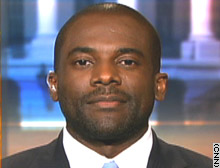|
| ||||||||||||||
Ex-JAG attorney: Iraq investigations face obstacles
 Attorney Hardy Vieux says fears and language will work against investigators. YOUR E-MAIL ALERTSWASHINGTON (CNN) -- The Pentagon is investigating the deaths of more than two dozen Iraqi civilians, including women and children, by U.S. troops. Under investigation is the alleged massacre by Marines of 24 civilians in Haditha last November; the death of an Iraqi civilian near Hamandiya, west of Baghdad, on April 26; and reports that soldiers killed two women at a checkpoint in Samarra on Tuesday. On Friday, Pentagon investigators cleared U.S. troops of wrongdoing in the deaths of 11 people killed during a U.S.-led raid against a suspected militant site near Balad on March 15. CNN's Carol Lin discussed the process of military investigations with attorney Hardy Vieux, a former defense counsel in the Navy's JAG Corps. LIN: So let's begin with the broader picture. Why do you think so many incidents ... have suddenly cropped up? VIEUX: Well, it seems to me like the combat stress is something that needs to be factored into -- in this situation. These men and women are under a lot of pressure, under a lot of stress. They're continually attacked by insurgents. And they just don't know who is friend or foe. So that really puts them on edge, and it really colors their perception of things. LIN: So how does the military go in and investigate? Crime scene investigators in the United States ... they go out, they gather physical evidence, they talk to witnesses. Can that sort of thing be done in a place like Iraq? VIEUX: Yes, it can be done, and it is being done. In fact, the Navy has what's called the Naval Criminal Investigative Service, and they also -- these are professional investigators that investigate alleged crimes in the Marine Corps and in the Navy. ... These investigative professionals are stationed on bases throughout the world. So they're ... there already, investigating the situations. And they would do it just like they would do any other law enforcement investigation here stateside. LIN: But they're members of the military, right? VIEUX: Most of these are -- no, they're civilians. LIN: They are civilians. So when they go into, say, a place like Haditha and they're interviewing witnesses, doesn't the mere fact that they in some form represent the U.S. government, doesn't that hamper their investigation? VIEUX: Well, it certainly does. I imagine that there are a lot of witnesses who would not at all feel free to speak to the NCIS. But nevertheless, that's a problem that they face all of the time and they know how to address. They're going to have language issues to deal with. Certainly, in terms of the time that has passed, they have to contend with that as well. But they're professionals. They know how to do this. And the defense attorneys are going to get their opportunity as well to do a thorough investigation to ascertain what exactly occurred. LIN: How do you thoroughly investigate something that happened back in November or even March? VIEUX: Well, that's certainly going to be an issue here. I mean, I'd rather be on the defense side of this one. Because the passage of time is going to really hamper the investigative process from the prosecution's point of view. Witnesses may have forgotten things, people are reluctant to speak. Just the facts are not easily ascertainable when so many months have passed and possibly a cover-up has taken place, as well. LIN: And you have the Iraqi prime minister speaking out, saying that he -- the government wants military files in Haditha. They want to conduct their own investigation. So how is that going to be reconciled? VIEUX: Well, that's going to be handled at a higher-up political level. There are a lot of people who are speaking on this matter: members of Congress, the president, what have you. So you have this issue of unlawful command influence. That is, are the statements made by these high-ranking superiors going to possibly influence the way a jury decides this issue? LIN: But which jury? I mean, a military jury or an Iraqi jury? Is it conceivable that a U.S. Marine could be jailed right next to Saddam Hussein? VIEUX: No. It's probably going to be a military jury. This is going to take place within the court-martial setting. LIN: But does Iraq have the legal authority to question a U.S. Marine and conduct its own criminal investigation and file charges? VIEUX: Not that I'm aware of, not with respect to the filing charges. Oftentimes, there's a standards of forces agreement in place that allows a service member, American service member, to be not turned over to a foreign host government. But I'm not sure that there is such a SOFA, as we call it, in place here. So it would be a court-martial investigation run and managed by the United States forces.
|
| |||||||||||||
| © 2007 Cable News Network. A Time Warner Company. All Rights Reserved. Terms under which this service is provided to you. Read our privacy guidelines. Contact us. Site Map. |
|

